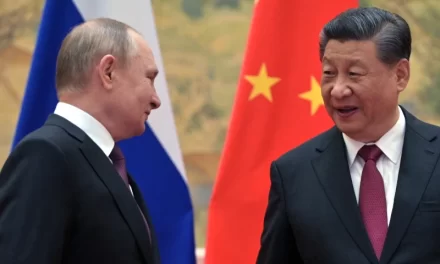By Jianli Yang
 Chinese President Xi Jinping has revived a decades-old term to refer to a key goal that China is now eager to achieve: “common prosperity.” Purportedly aimed at tackling the country’s growing income gap, the government is urging—in some cases, coercing—billionaires to share their wealth with the rest of society. The “common prosperity” slogan echoes back to the Chinese Communist Party’s (CCP’s) long-standing ideology of wealth-sharing. Mao Zedong, founding father of the People’s Republic of China, introduced the phrase in the 1950s. Decades later, Chinese statesman Deng Xiaoping proposed that China should “let some people get rich first” but deemed “common prosperity” to be the ultimate goal.
Chinese President Xi Jinping has revived a decades-old term to refer to a key goal that China is now eager to achieve: “common prosperity.” Purportedly aimed at tackling the country’s growing income gap, the government is urging—in some cases, coercing—billionaires to share their wealth with the rest of society. The “common prosperity” slogan echoes back to the Chinese Communist Party’s (CCP’s) long-standing ideology of wealth-sharing. Mao Zedong, founding father of the People’s Republic of China, introduced the phrase in the 1950s. Decades later, Chinese statesman Deng Xiaoping proposed that China should “let some people get rich first” but deemed “common prosperity” to be the ultimate goal.
Beijing’s stated objective is for China’s super-rich to spread their wealth among the less fortunate. A recent New York Times report notes that President Xi plans to pursue the “common prosperity” program zealously during his third term. Zhongnanhai has already been pressing cash-laden businesses and entrepreneurs to narrow the wealth gap by sharing their fortunes with the working class. The move coincides with China’s recent crackdown on Chinese billionaires, including Alibaba founder Jack Ma.
According to state-run Xinhua News Agency, “capital markets will no longer be a paradise for capitalists to get rich overnight.” In principle, the objective of achieving an equitable society is laudable; the program seeks to make schooling, housing, and healthcare more affordable and widely available across China. But it is undeniable that the government-imposed reversal of economic inequality entails subjugation and suppression of the wealthy class.
The best-known example of the recent crackdown on China’s billionaires is the case of Jack Ma. In October 2020, Ma criticized Chinese regulators for suppressing innovation. Within months, the valuation of his companies plummeted. In April, just before his company Ant Group was preparing to launch an initial public offering (IPO) estimated at US$35 billion, Chinese regulators imposed a record fine of US$2.75 billion on Alibaba for abusing its “dominant market position.” Ma’s empire was devastated, and he went “missing.” China’s effort to rein in the super-rich stems from the perceived threat they pose to the CCP and its members.
Jack Ma isn’t the only one on the receiving end of the long arm of the Chinese state. Earlier this year, China issued a warning to billionaire Wang Xing, founder of the online shopping platform Meituan. In May, Wang posted a poem criticizing Emperor Qin Shi Huang, who is said to have burned books to suppress intellectual dissidents. Many social media users regarded the post as an allusion to President Xi’s “anti-monopoly” campaign.
The (outwardly) positive response of China’s rich to the “common prosperity” campaign demonstrates the Chinese state’s hold over these tycoons. In January 2021, in his first public appearance since October 2020, Jack Ma said it was the “responsibility” of China’s entrepreneurs to strive for “common prosperity.” More recently, Alibaba announced that it would invest US$15.5 billion in common prosperity projects, including rural healthcare and insurance for delivery workers. Similarly, Chinese internet giant Tencent said it would set aside US$15.5 billion for social aid programs. And amid an antitrust investigation of Meituan by Chinese regulators, the company’s billionaire founder Wang Xing transferred roughly US$2 billion worth of his own shares to his philanthropic foundation.
Despite being a “socialist” country, China has a poor track record of implementing redistribution, and public spending is “overly concentrated in cities.” The supposed objective of the “common prosperity” initiative is to transfer a portion of urban-clustered wealth to the countryside. China’s urban-rural income gap has continued to rise in recent years, creating developmental challenges. The coincidence of the “common prosperity” campaign with the crackdown on China’s leading tech companies also signals that the CCP, for its own survival, wants to seize control of wealth owned by the capitalist class. For Xi Jinping, the CCP’s long-term authority is at stake. Speaking to party officials in January, Xi stated that “achieving common prosperity isn’t just an economic issue; it’s a major political matter bearing on the party’s foundation for rule.” This is an important signal, both domestically and for the global narrative against the West in general, as China moves beyond COVID-19.
Domestically, President Xi needs to deliver something to remain in charge of the CCP for another term, starting in 2022. There is the urge for greater party control over every aspect of economic activity, but there is a deeper economic need to find better ways to allocate China’s wealth.
Currently, the richest 1 percent of China’s population owns over 30 percent of the country’s wealth. In theory, when people have access to more money, their spending power increases and drives the economy upward. The real test will come when the Chinese government pushes through measures like property taxation. Notably, many of China’s wealthiest citizens have ties to the CCP. With housing as the main investment vehicle for many Chinese, any move to tax property could face resistance.
The first Chinese province to be tested in this regard is Zhejiang. The provincial government recently released a detailed plan, including a target to lift the average disposable income by 40 percent to around US$11,500 by 2025. The plan also aims to regulate “excessive income,” expand charity, and reduce the cost of childcare and housing.
The choice of Zhejiang as a pilot zone was an obvious one, as Xi served there as provincial party chief from 2002 to 2007. Zhejiang is also home to some of China’s most successful companies, including Alibaba Group, and dozens of China’s billionaires hail from the province.
President Xi’s “common prosperity” program has the potential to create a socioeconomic boom, but the enforced disappearances of citizens (such as Jack Ma) may further tarnish China’s already dismal human rights record, including on religious liberty. The Chinese state routinely engages in the extrajudicial seizure of private property, infringes on people’s right to security of person, and makes a mockery of due process. The CCP has now determined that China’s super-rich pose a threat to the party’s survival, and therefore must be targeted. Only time will tell how this decision plays out.
This article first appeared in Providence on October 8, 2021























